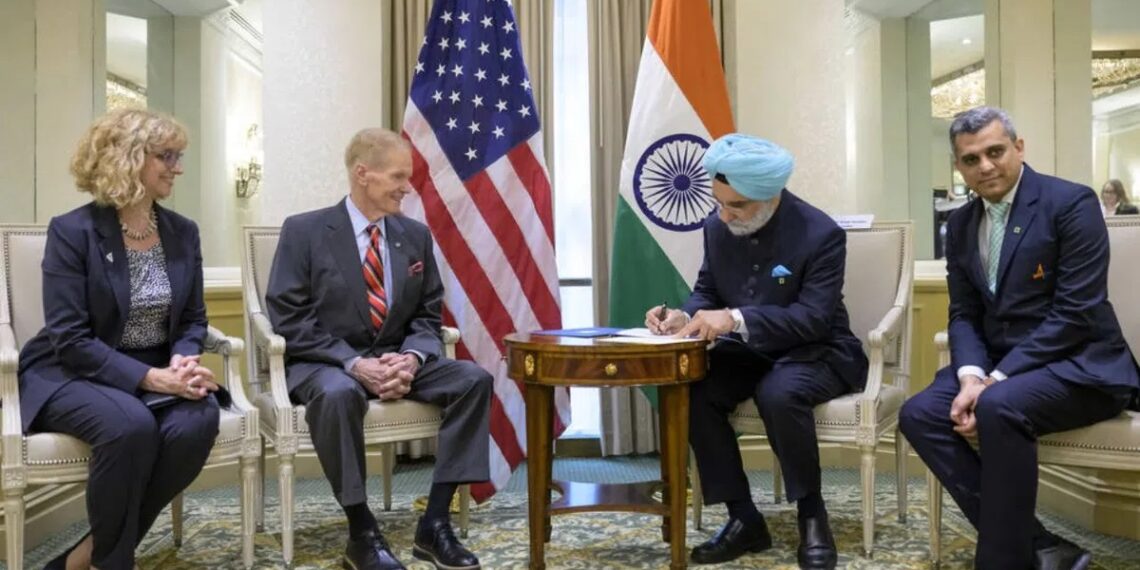Even as India has adopted a fast-paced approach to achieve some of its stated — and unstated — objectives in space, the forthcoming Indian Space Conclave to be held in Delhi between October 9 and 11, among other pressing issues, will deliberate on the recently formulated US-led Artemis Accords to which India is a signatory.
India became the 28th state to sign on to the Artemis Accords — said to be a landmark agreement between the Indian ambassador to the US and NASA — following prime Minister Narendra Modi’s visit to the country in June this year. While India has now become a member of this select club, the Accords hold profound implications since it is expected to trigger a significant shift in the country’s stand and policy on space exploration. Besides the US, the Artemis Accords, established in 2020, have seven other founding member states – Australia, Canada, Italy, Japan, Luxembourg, the United Arab Emirates and the United Kingdom.
The July 14 Chandrayaan-3 moon mission, its successful landing on the lunar surface last month and now the Aditya-1 project to study aspects of the sun constitute small but significant steps towards a more rapid thrust to achieve the objectives set out by the Artemis Accords.
“While the Artemis Accords are non-binding and lack the formal structure of a treaty in its strict sense, India’s participation signifies a substantive shift in the country’s approach to exploring the moon and outer space. This has the potential to significantly impact India’s long-term space policy and global strategic positioning,” Lieutenant General (retd) A K Bhat, Director-General of the Indian Space Association (ISpA), a body of large space companies and start-ups, said.
Part of the Indian decision to be an Accords member state is to try and catchup with China’s formidable space programme. However, to be an Artemis Accords member state would not only involve exchanging knowledge with other countries, conducting joint research and development, technology transfer, collaborations on space missions, satellite communication, earth observation and developing space applications, but also signifies a larger “paradigm shift”.
This could be potentially controversial as this would involve a transformation in viewing and utilising space as a “shared heritage of mankind” or a “global commons” to actually using the Artemis Accords as a leverage to gain “legal right of access” for nations willing to achieve their objectives in space.
Till before the signing of the Artemis Accords, India followed the “principle of global consensus and cooperation on space”. Indian policy makers and space scientists “consistently supported” the 1967 Outer Space Treaty which is the “foundational framework” for not only exploration but also other endeavours for peaceful purposes. But India’s changed position on space as a consequence of being an Artemis Accords signatory, from following a cooperative approach globally to align itself with US interests in space will have “far-reaching implications”, according to a senior Department of Space official.
The Artemis Accords, Indian officials and private players agree, are closely linked to NASA’s Artemis Program which not only seeks to propel humans to the moon but also aims to prepare the ground for future missions to Mars and beyond. India’s declaration some time ago to position an Indian astronaut on the International Space Station in 2024 implies that its policy-makers aim to play a more pro-active role in space along with the US. For India, this could have diplomatic implications and significantly impact international relations.
There is no doubt that being an Artemis Accords member state would fulfil India’s objective of developing capabilities to access cutting-edge technology, scientific and technical expertise and collaborative partnerships that will enable it to adopt faster means to achieve space-related goals.
While the Indian Space Conclave will seek to attract large private companies and involve them in the national space programme, once it is fully aligned with the Artemis Accords principles and objectives, India started exploring opportunities for partnering with international players in 2022. To scout for talent partners, two top executives from the Jeff Bezos-founded Blue Origin space exploration company held a one-day workshop at the Bangalore International Centre on November 1, 2022, to take “initial steps” and attract “cooperation modes” for “international engagement opportunities” for Orbital Reef which is expected to replace the NASA-led multinational ISS.
A commercially developed, owned and operated space station, Blue Origin’s Orbital Reef will “start operating as a next generation business park beyond earth, with the ability to provide access to space for all”. Led by two principle partners, Blue Origin and Sierra Space, Orbital Reef’s development will be supported by “uniquely experienced and future-thinking team of investors, space systems and service companies”.
Attended by 30 participants, including representatives from a cross-section of Indian stakeholders such as technical experts, academics, policy influencers, cultural leaders and entrepreneurs, the workshop focused on technology and civil mission objectives involving science, culture, business opportunities and “symbolism” of “being part of a global commercial space station”.
“Blue Origin was here to explore possible tie-ups in India and discover capabilities among entrepreneurs and other talents in space,” Lt Gen Bhat said.
Indian space industry sources said that any domestic participation or partnering for Orbital Reef will “hopefully” take place once ISRO’ s Gaganyan project, which could be part of India’s Artemis Accords objectives, is launched in 2024. The trials for the Gaganyan project, which involves sending humans to space, are expected to be completed by 2023 even as astronauts, earlier trained by Russia, are now undergoing intensive skill development missions in Bengaluru.
The sources said that while Indian participation in Orbital Reef was “ambitious”, serious attempts were being made to build a growing commercial ecosystem in earth’s orbit and this expected to unlock the potential for new discoveries and new forms of entertainment while promoting a new level of interconnected global awareness.















